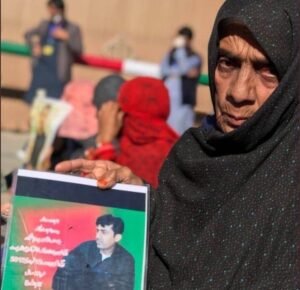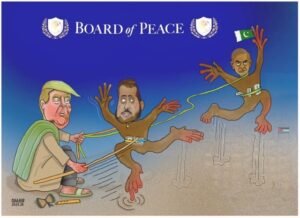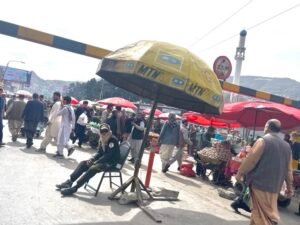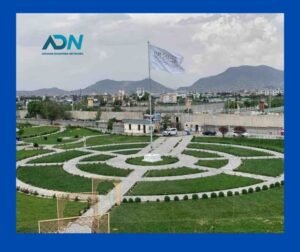Forbidden Love: A Tale of Hope, Challenges, and Separation
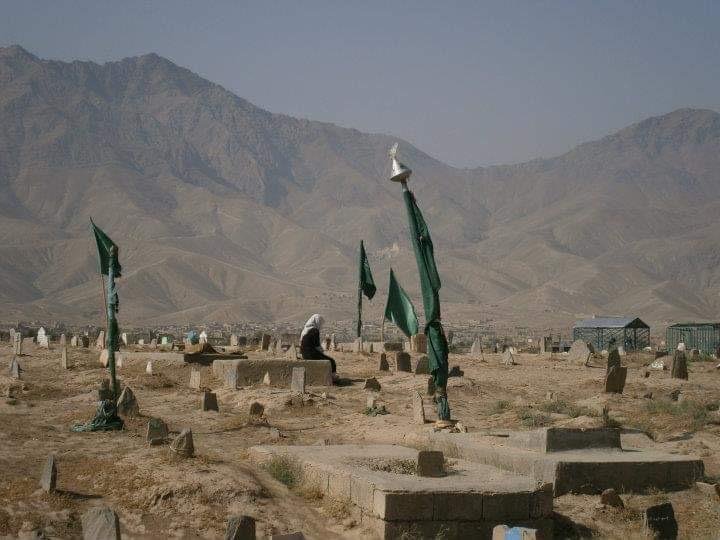
Western part of Kabul. Photo: @Masomah Regl
By Masomah Regl
They were neighbors. Both their families had fled the war in Afghanistan and lived among the tens of thousands of refugees in Peshawar, Pakistan. As the only possible source of income, each family had set up a rug loom and everybody sat there from 5 o’clock in the morning until 6 o’clock in the evening, weaving row after row. The kids’ little hands were much faster than the grown-ups’, so they were forced to sit and do most of the work. Mahram hated it.
He was about twelve years old when he noticed her – the daughter of the neighbor with whom they shared the courtyard. First, he secretly observed her. She had beautiful brown, almost black eyes. A pretty little nose. Her headscarf almost always matched her dress. He then proceeded to make the first contact: When she went to wash the dishes at the well, he immediately abandoned his rug, murmuring “toilet”, rushed towards the well and pumped the water for her. With a bright smile on his lips, he said, “Salam, khobi?” – “Hi, how are you?” – when she looked up in surprise. That’s when their eyes met for the first time. From then on, Mahram was filled with energy and excitement. All the difficult circumstances of being very poor, a refugee, an ethnic Hazara boy, growing up in an illiterate family and being forced to sit at the rug loom all day long – all of that suddenly mattered little to this young teen. His heart was filled with love. He dreamt of her. He thought of her when his mother or elder brother roughly woke him from his sleep at dawn. He hoped to run into her on his way to the well, where he used to quickly wash his face before having a cup of black or green tea and a piece of nan for breakfast with his family. Sometimes they’d coincide at the well or queuing in front of the pit toilet. Mahram loved those precious little moments. Soon she started to smile back shyly, which lifted his mood for the whole exhausting day.
Knitting a rug for hours and hours without a break was painful for his fingers, his back, his neck and his buttocks. The heat was unbearable and the paka with its constant buzzing just swirled the hot air around with no cooling effect. But the Bollywood music from the little radio transported Mahram to another planet: Oh those intense cries for love, mostly impossible love, those beautiful tunes, the sounds of heartbreak and the pain of being in love! He soon learned to understand the lyrics in Hindi and let himself be carried away by them. Whenever he was sent to buy some vegetables from the market nearby, he negotiated to get the kilo of onions or potatoes a little cheaper and secretly kept the change in the deep pockets of his perahan. After a few days, he had collected enough rupees to buy a cheap and cheesy little set of a necklace and earrings. As soon as he got the chance to briefly catch her without others noticing, he took her hand and placed the present in it. “It’s for you, janam”, he said. The few seconds of intimacy felt like an eternity, both for him and the girl. Someone stepped out from the house and into the yard, so they instantly let go of each other’s hand and gaze and acted casual. Before they parted ways, he whispered, “Meet me in the tashnab at 10:00 o’clock!”
This is how Mahram’s first big love story began. For a few months they managed to see each other a few times a week in the only private space available: in the little cabin of the pit toilet. They were madly in love – the beauty of their feelings ousted any bad smell or excruciating heat. He continued to buy or steal little presents for her – a red lipstick, colourful juri – bangles, a beautiful silk headscarf – and she grew very fond of his attention and tenderness.
Life was beautiful; probably the most beautiful it could ever get for those young people whose families had fled war and desperately tried to make a living in the neighboring country. Mahram and the girl did not feel the suffering of their pitiful existence anymore – rather, it was kind of a game for them to manage their secret relationship. Despite being very cautious to hide their young and forbidden love from the other family members, they couldn’t really hide away the sparks in their eyes, their beaming joy, the butterflies in their stomachs. All of that still continued to go unnoticed by either family for quite a long time because everybody was busy with the daily routine and their sorrows. Neither of the families were accustomed to catering to a teenage child. Both families had a rather rough way of communicating with and treating each other. That’s how it took the parents and siblings months before they caught wind of the secret meetings between the two. When Mahram’s parents found out that he was having an affair with the neighbor’s young daughter, his dad wouldn’t stop beating him. Oh, did he get the stick! His poor little body, already so lean and tiny from being malnourished and from working hard from an early age on, got so bruised and battered that he couldn’t find a position to sleep. It hurt badly, but for nothing in the world would he give up his love for this girl. His feelings were pure and deep, no stick could have been strong enough to break his love. The only thought he had while getting wildly berated and beaten by his father was how badly the girl was being punished by her family. He prayed to God that he might get double the strokes if it could spare her some.
It passed. The families were too busy with their hard lives to bother any longer with the scandalous behavior of their teenagers. Because soon after, word had it that Afghans could return to their home country.
Afghanistan. Apparently, it had come out of the Dark Age. Mahram’s family was hesitant at first: Was it true? The brutal Taliban who massacred their neighbors, bombed their city, wounded family members, made them starve and leave everything behind to seek refuge in Pakistan – were they really gone? Was it safe to return with all the kids? Did the UN really hand out a bag of rice, a can of oil and blankets to all the families that decided to return to their houses – or to what was left of them? Stories of positive returns accumulated, so one day Mahram’s father announced that they too were leaving Peshawar.
Before he knew what was happening, Mahram and his family were on their way to Kabul. It was long before the widespread use of mobile phones and the internet. While everyone was excited to end their exhausting lives as refugees and to go back to where they actually belonged, Mahram was devastated. How would he ever find his beloved girl again in Afghanistan? Her family hadn’t made up their mind yet whether they would settle in the capital or return to her father’s province. And there was no way he could find out. Sitting atop an overloaded truck, next to men and boys who had been through so much hardship and yet beamed with joy and anticipation, he felt his life falling apart.
Their house in the Western part of Kabul, Dashte Barchi, was still there. “Allah u Akbar, Allah u Akbar”, Mahram’s father whispered when he opened the metal door to the house he had once built with his own sweat and money. The children curiously ran into the yard and yelled “Ya Allah, rasidim bakhair” – we have finally arrived! Mahram’s parents fought back the tears that had filled their eyes and ordered the children to help carry in the bags of rice and the cans of oil they really did receive when they crossed the border into Afghanistan. Now it was time to grab the broom and brush away the dust, the agony, the war crimes that this house had witnessed.
This spirit of new beginnings, the hopefulness and joy of being back in Kabul got to Mahram too, of course. Such was his character: Happiness and joy always won over negative feelings. He loved to discover the streets of Kabul. Unlike in Peshawar, he could understand everybody’s language. And everybody was in the same situation here – happy to be back but struggling to build a life and find a source of income. Mahram lived very much in the present. He lived day by day, and every day had another adventure prepared. But he still couldn’t stop thinking about the love of his life. Where was she? How could he find her in this buzzing capital city with millions of inhabitants? He sold colorful headscarves on one of the busiest streets in the city center and secretly hoped to accidently come across the girl. He asked around to see if he could somehow discover any relatives of hers. After all, this was how it worked with Afghans: Without knowing street names or addresses, without phone numbers or surnames, without knowing how to read or write – people organized their lives and gathered all the information they needed by talking to others. Miraculously, one always found someone who knew someone. Unfortunately though, in his case he was not as lucky.
He missed her terribly. So much that his heart literally ached. How cruel it was to love someone in a culture where love was forbidden, and in times in which love was impossible. Although Mahram was not especially religious, he started to visit the blue Sakhi mosque. He kissed the colorful cloths that people had tied around the pillars in the mosque, and prayed to Allah for help in his search for the girl. Every Friday he went there and prayed intensively, making all kinds of promises to Allah if He only made her appear. One day, his prayers were finally heard. He spotted her with her mother and sisters right at this mosque! His heart leapt, and he rubbed his eyes in disbelief and excitement. Her face lit up; it was like in a Bollywood love film – the whole world around them fell silent; the two lovers only heard each other’s galloping heartbeat while gazing intensely into each other’s souls through their eyes. God is great!
What a beautiful and lucky turn that could have been to this love story. But it wasn’t meant to be. The girl was already engaged to another man from her extended family. It goes without saying that the marriage was arranged and the girl’s consent not asked. Once again, Mahram’s heart was broken, all hope shattered. Not to mention the girl’s painful fate. In that world, even the strongest love was powerless against traditions, families and cultures.
The years passed. Afghanistan emerged from the Dark Age into the international spotlight. Kabul changed fast; but many, like Mahram and his family, continued to struggle to make a living. Time did not heal, but the heartbreak he had experienced, as always, faded away. He fell in love again. And again. He loved life; he loved being in love and never stopped believing in romantic love, which got him in a lot of trouble a lot of times. Mahram joined the Afghan Army and travelled the country in his military uniform with a rifle on his shoulders. He finally settled in Kandahar, got married and had four children. He reached a certain level of wealth, relaxed, and stopped looking for adventures. His looks changed as the signs of poverty disappeared from his face and body. He was well-nourished for the first time in his life and was a loving husband and father.
Until a roadside bomb beneath his motorcycle ended his life and he became a number on the list of the 243,000 people killed in the “War Against Terror” in Afghanistan raging since 2001.
He should not be remembered as just a statistic, one of thousands of Afghan Army soldiers, but as an Afghan man filled with love, always looking for love and believing in love.
Masomah Regl is the founder of Afghan diaspora organization “FIVESTONES” based in the Austrian city of Graz.
Note: The contents of the article are of sole responsibility of the author. Afghan Diaspora Network will not be responsible for any inaccurate or incorrect statement in the articles.





